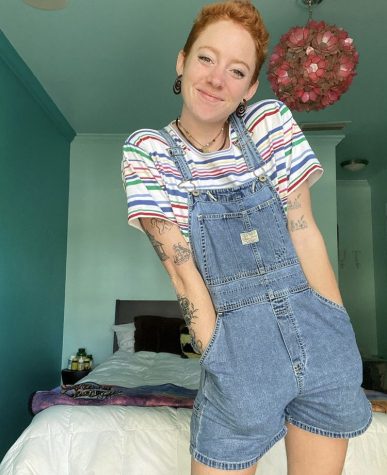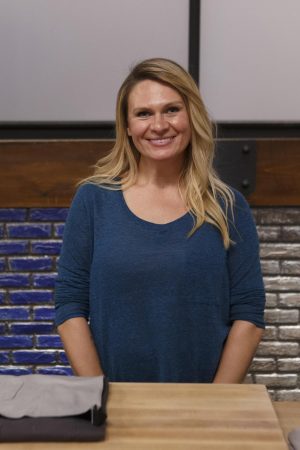App State alumna’s viral TikTok raises questions about professor, student well-being
February 26, 2021
TikTok, the space often used for learning new dances, seeing a day in someone’s life or just for laughs is one of the top social media platforms. However, some of its users are using the platform to call attention to problems or misgivings they have.
An App State alumna is one among an estimated 100 million users of the app in the U.S. She is using TikTok to bring forward complaints she has about a professor in a series of videos that now total almost 2.1 million views. Her TikToks set off alarms across social media this week after she interpreted an email from her professor as him telling her to get cancer “at a more convenient time.”
Anna Randall, who graduated from the university in December, initially posted a TikTok Dec. 3 claiming that her professor, Eric Frauman in the Department of Recreation Management and Physical Education, wouldn’t give her an extension on her final paper.
Randall asked for the extension after getting surgery to remove a tumor. She was diagnosed with stage 1 melanoma just after Halloween, but is now recovered.
“I know that COVID has been really difficult for everyone this semester and that everyone is having a really terrible time … I just have to share with you what the (obscenity) my professor just said,” Randall said in her video.
She then shared a screenshot of an email exchange she had with Frauman. She emailed him about her grade on a final assignment, saying, “This is ridiculous. We sent you our paper 3 times and you never said any of the things listed on your grading review here were an issue. You ASSURED us that this would be an A paper before we turned it in and congratulated us on being the only group to have sent you a draft.”
Frauman responded, telling Randall that she did not follow instructions on several parts of the final quiz in the class and that her group members did not upload their final paper.
“I had suggested you consider your health earlier in the semester and seek other options to finish my course,” he wrote. “You chose not too (sic) and unfortunately your overall grade may have suffered. In short, your group, and yourself, underperformed at times this semester and your final grade reflects that.”

Randall says this was Frauman telling her to get cancer “at a more convenient time.” He did not use those words, however.
“It is important to note that while we are aware of many communications, we have no indication Dr. Frauman denied Anna options to complete her work nor any indication that he told Anna she should have gotten cancer ‘at a more convenient time,’” Megan Hayes, associate vice chancellor and chief communications officer for the university wrote in an email.
After the exchange, Randall brought concerns about Frauman’s response and teaching throughout the semester to the Office of the Dean of Students, which referred her to the Beaver College of Health Sciences dean, Marie Huff.
The dean of students’ office has a case management department responsible for helping handle class absences related to circumstances like death of loved ones, hospitalizations or interpersonal violence. For ongoing problems like chronic mental or physical health ailments, the university requests that students get in contact with the Office of Disability Resources.
“App State has options available for students to take a grade of ‘incomplete’ and finish coursework at a later date, in the event they are facing illness or some other unavoidable cause that prevents them from successfully completing their coursework by the end of the term,” Hayes said. “Dr. Frauman took advantage of this policy and offered to extend her coursework deadlines through May 2021. Additionally, the department chair and academic dean have been engaged with Anna for a number of weeks to address her concerns.”
Huff referred Randall’s concerns to recreation management department chair Melissa Weddell.
“I sent her all of the information that I’ve sent to all the other deans about (the situation) like screenshots from all of his emails that he sent us and exact quotes from what he said, on his reviews from our paperwork from like our coursework, and grading notes and things like that,” Randall says.
After getting in contact with Weddell, the two spoke on the phone for more than an hour. Randall shared the same screenshots from their emails and grading. Weddell said she’d speak with Frauman at the time of their annual reviews in January and February. In the meantime, she asked Randall to write Frauman a letter, which she did.
Frauman ended up giving Randall an 80 on her group’s final paper and she ended the class with a 70.5, good enough to pass.
Randall was still upset by the treatment she felt she received, and emailed Weddell to follow up on their reviews on Jan. 15 and again on Feb. 3. Weddell reassured her that when she met with Frauman, she would address Randall’s concerns.
However, on Feb. 15, Randall sent Weddell another email which she called “a little more aggressive.”
“I was just like, ‘this is no longer about Eric Frauman’s negligence, this is also about yours,” Randall said. “If you guys aren’t willing to care for your students, I’m going to take matters into my own hands.”
Randall’s Feb. 15 TikTok about the situation now has more than 1.2 million views, almost 300,000 likes, more than 6,500 comments and just over 8,400 shares. The video made it to other social media platforms too, like Instagram, Facebook and Twitter, with viewers saying things like “Rate my professor just got interesting” and “drop the emails.”
Randall shared Huff, Weddell and Frauman’s emails on the TikTok, along with a template email for viewers to send.
Social media shaming has emerged as a means to call attention to mistreatment and shady pasts. Additionally, COVID-19 has brought out even greater instances of social media shaming by calling out those who don’t follow COVID-19 restrictions.
Since the video was posted, Randall says she’s been contacted by students who have faced similar challenges and lawyers who want to represent her in a suit, but she isn’t looking for that.
“My intention is mostly just to not let this happen again,” she said. “I want these professors to know that they can’t treat human beings like that, especially not human beings who are paying to be at this school to learn and to, you know, succeed.”
Hayes says that the university applauds Randall’s resilience last semester – she also had to return home to Florida twice because her uncle and mother were diagnosed with cancer between August and November.
“We recognize she was facing serious health challenges during an already stressful time while also completing the final hours of her undergraduate requirements,” Hayes said.
Hayes said that the university takes matters of student health and safety very seriously and that there are many people who care about students’ well-being across campus. She says the university reached out to Randall from several offices at the university after her graduation.
“Dr. Frauman earned his tenure by maintaining a record of excellence for his academic achievements and service, and he has a longstanding reputation of empathy and compassion for his students,” Hayes said.
Frauman won the Wayne Duncan Faculty Enrichment and Teaching Fellowship for Excellence in Teaching in General Education in 2017 and has a rating of 4.1/5 on RateMyProfessors.com.
”We urge compassion for both Anna and Dr. Frauman moving forward,” Hayes said.














